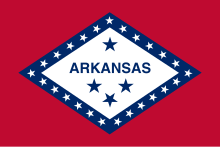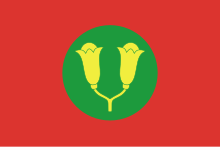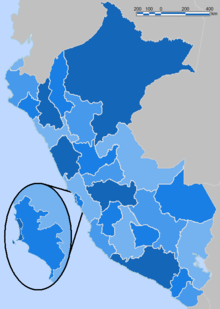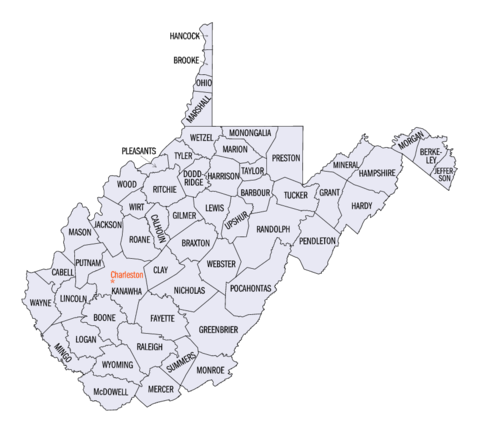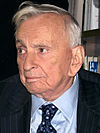Portal:Politics
| Main | Topics and categories | Tasks and projects |
The Politics portal
Politics (from Ancient Greek πολιτικά (politiká) 'affairs of the cities') is the set of activities that are associated with making decisions in groups, or other forms of power relations among individuals, such as the distribution of resources or status. The branch of social science that studies politics and government is referred to as political science.
It may be used positively in the context of a "political solution" which is compromising and non-violent, or descriptively as "the art or science of government", but also often carries a negative connotation. The concept has been defined in various ways, and different approaches have fundamentally differing views on whether it should be used extensively or in a limited way, empirically or normatively, and on whether conflict or co-operation is more essential to it.
A variety of methods are deployed in politics, which include promoting one's own political views among people, negotiation with other political subjects, making laws, and exercising internal and external force, including warfare against adversaries. Politics is exercised on a wide range of social levels, from clans and tribes of traditional societies, through modern local governments, companies and institutions up to sovereign states, to the international level.
In modern nation states, people often form political parties to represent their ideas. Members of a party often agree to take the same position on many issues and agree to support the same changes to law and the same leaders. An election is usually a competition between different parties.
A political system is a framework which defines acceptable political methods within a society. The history of political thought can be traced back to early antiquity, with seminal works such as Plato's Republic, Aristotle's Politics, Confucius's political manuscripts and Chanakya's Arthashastra. (Full article...)
Selected article
The European Union is an international organization of 27 European states, established in 1992. It originates from the Coal and Steel Community, founded in 1951 by Germany, France, Italy and the Benelux countries. However, the French-German politician Robert Schuman presented his proposal of a united Europe, known as the Schuman declaration, already in 1950, which is considered to be the beginning of what is now the European Union. The Union has many activities, the most important being a common single market, consisting of a customs union, a single currency, a Common Agricultural Policy and a Common Fisheries Policy.
Featured picture

Dr. Javier Solana was the High Representative for the Common Foreign and Security Policy and the Secretary-General of both the Council of the European Union (EU) and the Western European Union (WEU). This photograph shows him discussing with students of RWTH Aachen University, one day before receiving the International Charlemagne Prize of the city of Aachen.
Selected quote
Selected biography
Ban Ki-moon (born 13 June 1944) is a South Korean diplomat and the former Secretary-General of the United Nations. Before becoming Secretary-General, Ban was a career diplomat in South Korea's Ministry of Foreign Affairs and in the United Nations. He entered diplomatic service the year he graduated college, accepting his first post in New Delhi. In the foreign ministry he established a reputation for modesty and competence. Ban was the Foreign Minister of the Republic of Korea from January 2004 to November 2006. In February 2006 he began to campaign for the office of Secretary-General. Ban was initially considered to be a long shot for the office. As Foreign Minister of South Korea, however, he was able to travel to all of the countries that were members of the United Nations Security Council, a manoeuvre that turned him into the campaign's front runner. On 13 October 2006, he was elected to be the eighth Secretary-General by the United Nations General Assembly. On 1 January 2007, he succeeded Kofi Annan, and passed several major reforms regarding peacekeeping and UN employment practices. Diplomatically, Ban has taken particularly strong views on global warming, pressing the issue repeatedly with United States President George W. Bush, as well as Darfur, where he helped persuade Sudanese President Omar al-Bashir to allow peacekeeping troops to enter Sudan.
Did you know (auto-generated) -

- ... that Michita Sakata declined an offer to be Prime Minister of Japan because he thought the role was too political?
- ... that Disney once created a political advertisement for Dwight D. Eisenhower (featured)?
- ... that before becoming the mayor of Medan, Indonesia, Agus Salim Rangkuti acted in movies and oversaw a real-life political prison camp?
- ... that Walker Keith Baylor, a strong believer in phrenology and physiognomy, determined the fitness of political candidates by measuring their faces and heads with a tape measure?
- ... that one abolitionist said that William L. Breckinridge's anti-slavery views would "disqualify [him] from political usefulness"?
- ... that What Hath God Wrought, the 2007 history of Jacksonian America written by Daniel Walker Howe, is dedicated to Andrew Jackson's "political nemesis" John Quincy Adams?
More did you know...
- ...that Republican National Committee official Rob Bickhart wrote a PowerPoint presentation for a meeting of Republican fundraisers which depicted Nancy Pelosi as Cruella de Vil?
- ...that following its 1994 national convention, the Progress Party of Norway lost its deputy leader and the four MPs Christiansen, Hillgaar, Wetterstad and Bråthen?
- ...that Democrat Mayor Thomas G. Dunn, national co-chairman of Democrats for Nixon, was "read out of the party" for his support of Republican President Richard Nixon's 1972 re-election bid?
- ...that Mussolini's Quota 90 fixed the lira exchange rate against the pound sterling at the prevailing rate from five years earlier, when he assumed power?
- ...that the energy lobby contributed 19 million dollars to United States political campaigns in the 2006 election cycle?
- ...that the lifelong Democrat Jim Naugle is in his sixth straight term as the Mayor of Fort Lauderdale and supported only Republicans for President since 1968?
- ...that the Brown Dog affair, an Edwardian era vivisection controversy, led to massive riots?
- ...that tiao-kuai is the quasi-federal administration system in China?
In this month
- April 1, 1979 – Iran's government becomes an Islamic Republic by a 98% vote, overthrowing the Shah officially.
- April 9, 1948 – the period known as La Violencia begins with the assassination of Colombian Liberal Party leader Jorge Eliécer Gaitán. For the next ten years Liberals, Communists and Conservatives would fight each other in the conflict.
- April 9, 2003 – Government of Saddam Hussein overthrown by American forces in Iraq.
- April 19, 2006 – Han Myung-sook becomes South Korea's first female Prime Minister.
- April 24, 2005 – Presidential elections in Togo return Faure Gnassingbe to power two months after he was installed by the military following the death of his father, Gnassingbé Eyadéma.
- April 28, 1937 – Saddam Hussein, the President of Iraq was born.
- April 30, 1945 – Adolf Hitler and his wife Eva Braun, commit suicide as the Red Army approached the Führerbunker in Berlin. Karl Dönitz succeeds Hitler as President of Germany; Joseph Goebbels succeeds Hitler as Chancellor of Germany.
News and Current events
- August 11: 4 local government areas in New South Wales, Australia locked down after COVID-19 case
- August 11: Australia: AstraZeneca vaccine access expanded by Victorian government
- August 1: Australia: Victorian lockdown lifted
- July 29: Tunisia's president dismisses prime minister, suspends parliament
- July 25: Australia: Wikinews interviews Reg Kidd, mayor of the City of Orange, about COVID-19 lockdown and local government
- July 23: South Australia enters week-long lockdown to contain COVID-19 Delta variant spread
- July 21: Technological University Dublin senior lecturer Dr Lorcan Sirr speaks to Wikinews on housing market in Ireland
- July 21: Three rural councils in New South Wales, Australia enter 7-day lockdown
- July 21: Australia: Victoria lockdown extended by a week with 85 active cases recorded
- July 15: California governor signs new state budget, eligible Californians to get stimulus payments
Topics and categories
General images
Related portals
Associated Wikimedia
The following Wikimedia Foundation sister projects provide more on this subject:
-
Commons
Free media repository -
Wikibooks
Free textbooks and manuals -
Wikidata
Free knowledge base -
Wikinews
Free-content news -
Wikiquote
Collection of quotations -
Wikisource
Free-content library -
Wikiversity
Free learning tools -
Wiktionary
Dictionary and thesaurus





